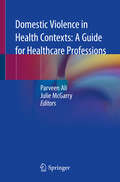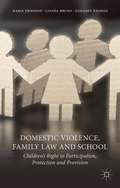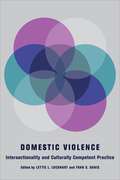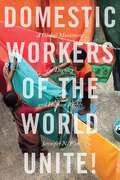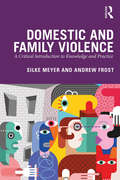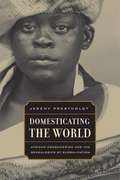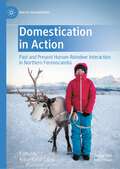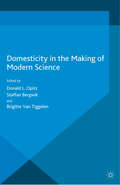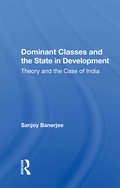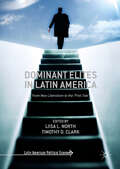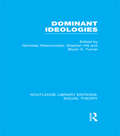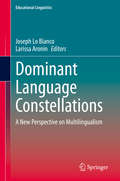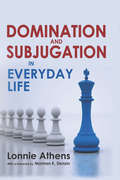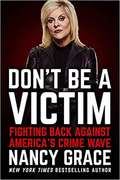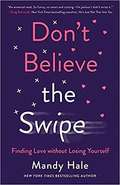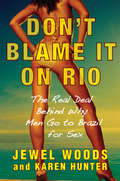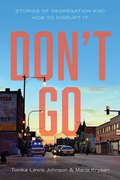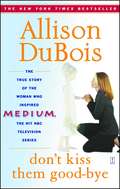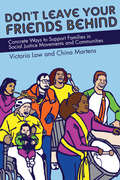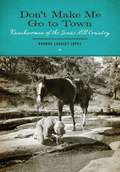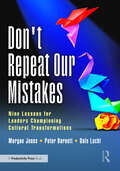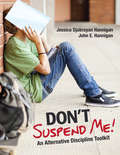- Table View
- List View
Domestic Violence in Health Contexts: A Guide for Healthcare Professions
by Parveen Ali Julie McGarryThis book is taking a broad health focused approach towards Domestic Violence and Abuse (DVA). It is now well established that DVA exerts a significant and detrimental impact on the health and wellbeing of those who experience abuse. Universally healthcare professionals encounter individuals and families where DVA is or has taken place. This book is beneficial to a range of health care professionals through an exploration of theories and classifications of DVA, consideration of DVA in different contexts and consideration of the core issues surrounding working with individuals and families where DVAhas been identified. It provides a much needed evidence based addition to the existing texts in this field in terms of the inclusion of real life scenarios, reflective exercises and pointers for further practice development. This book is a key point of reference for professionals working within a broad range of health care environments.
Domestic Violence, Family Law and School: Children’s Right to Participation, Protection and Provision
by Maria Eriksson Linnéa Bruno Elisabet NäsmanDomestic Violence, Family Law and School discusses the ways in which domestic violence can impact on children's lives at pre-school and school. Disputes over parental responsibility, living arrangements or child contact can create difficulties not just for the child of disputing parents, but for all children at preschool or school, as well as for staff. This book uncovers new research on an under-explored area of children's lives and social work with vulnerable children and is shaped by a comparative lens that brings both similarities and differences between England, Wales and Sweden into focus. A theoretical framework for analyses of how welfare systems tackle domestic violence is elaborated and lessons for practice that can be drawn from the findings presented are highlighted.
Domestic Violence: Intersectionality and Culturally Competent Practice (Foundations of Social Work Knowledge Series)
by Fran S. Danis Lettie L. Lockhart Eds.In Domestic Violence: Intersectionality and Culturally Competent Practice, experts working with twelve unique groups of domestic abuse survivors provide the latest research on their populations and use a case study approach to demonstrate culturally sensitive intervention strategies. Chapters focus on African Americans, Native Americans, Latinas, Asian and Pacific Island communities, persons with disabilities, immigrants and refugees, women in later life, LGBT survivors, and military families. They address domestic violence in rural environments and among teens, as well as the role of religion in shaping attitudes and behavior. Lettie L. Lockhart and Fran S. Danis are editors of the Council of Social Work Education's popular teaching modules on domestic violence and founding co-chairs of the CSWE symposium on violence against women and children. In their introduction, they provide a thorough overview of intersectionality, culturally competent practice, and domestic violence and basic practice strategies, such as universal screening, risk assessment, and safety planning. They follow with collaborative chapters on specific populations demonstrating the value of generalist social work practice, including developing respectful relationships that define issues from the survivor's perspective; collecting and assessing data; setting goals and contracting; identifying culturally specific interventions; implementing culturally appropriate courses of action; participating in community-level strategies; and advocating for improved policies and funding at local, state, and federal levels. Featuring resources applicable to both practitioners and clients, Domestic Violence forms an effective tool for analysis and action.
Domestic Violence: The Five Big Questions (International Library of Criminology, Criminal Justice and Penology - Second Series)
by Mangai NatarajanDomestic Violence is not just a public health and criminal justice problem, it is also an issue of universal human rights that needs immediate and vigorous attention. How we measure the prevalence of Domestic Violence, what we identify as the risk factors, which theories seem to provide most help in understanding and responding to Domestic Violence, which preventive and treatment programs seem most effective and the respective roles of the health and criminal justice systems, are all questions of vital importance in society's response to the problem.
Domestic Workers of the World Unite!: A Global Movement for Dignity and Human Rights
by Jennifer N. FishFrom grassroots to global activism, the untold story of the world's first domestic workers' movement.Domestic workers exist on the margins of the world labor market. Maids, nannies, housekeepers, au pairs, and other care workers are most often ‘off the books,’ working for long hours and low pay. They are not afforded legal protections or benefits such as union membership, health care, vacation days, and retirement plans. Many women who perform these jobs are migrants, and are oftentimes dependent upon their employers for room and board as well as their immigration status, creating an extremely vulnerable category of workers in the growing informal global economy. Drawing on over a decade’s worth of research, plus interviews with a number of key movement leaders and domestic workers, Jennifer N. Fish presents the compelling stories of the pioneering women who, while struggling to fight for rights in their own countries, mobilized transnationally to enact change. The book takes us to Geneva, where domestic workers organized, negotiated, and successfully received the first-ever granting of international standards for care work protections by the United Nations’ International Labour Organization. This landmark victory not only legitimizes the importance of these household laborers’ demands for respect and recognition, but also signals the need to consider human rights as a central component of workers’ rights. Domestic Workers of the World Unite! chronicles how a group with so few resources could organize and act within the world’s most powerful international structures and give voice to the wider global plight of migrants, women, and informal workers. For anyone with a stake in international human and workers’ rights, this is a critical and inspiring model of civil society organizing.
Domestic and Care Work in Modern France: Gender, Family and the State (French Politics, Society and Culture)
by Jan WindebankThis book explores the organization and divisions of labour of domestic and care work in modern France and in so doing, reveals some of the drivers of and obstacles to change in the relationship between gender, the family, and the French state. The book finds that both the policies and social norms that structure how domestic and care work is carried out and by whom in contemporary France have been influenced by historical legacies dating back to the Revolution such as French Republicanism and pronatalism, and more recent political currents such as the self-management movement and materialist feminism. Chapter 1 sets out the analytical framework for the book, while Chapter 2 explores the historical legacies that help shape contemporary domestic and care work in France. Chapters 3, 4, and 5 focus on the specific activities of parental and childcare work, long-term care for adults, and domestic work in the contemporary period. Chapter 6 discusses the effects of the COVID-19 restrictions on domestic and care work, and Chapter 7 concludes the discussion.
Domestic and Family Violence: A Critical Introduction to Knowledge and Practice
by Silke Meyer Andrew FrostDomestic and family violence (DFV) is an enduring social and public health issue of endemic proportions and global scale, with multiple and lasting consequences for those directly affected. This book tackles current debates in the field and addresses the social norms and settings that perpetuate this type of violence, along with implications for service delivery. The book offers a thorough introduction into the nature and extent of DFV in contemporary social contexts and serves as a foundation for informed practice. It provides a firm theoretical and empirical overview of core issues, covering the challenges and support needs experienced by those affected, along with the implications this raises for the range of relevant response services. The authors also offer insight into the predominantly gendered nature of DFV and its influence beyond the traditional couple context, across age, gender, sexual orientation, cultural background, and family relationships. Drawing on theoretical explanations, international research, and practice experience, they highlight examples of good practice and holistic responses, including primary, secondary, and tertiary prevention. Written in a clear and direct style, this book will appeal to students and scholars of criminology, sociology, and social work engaged in studies of domestic and family violence, violence against women, and intimate partner violence. It will be an invaluable resource for those designing, coordinating, and conducting service responses.
Domesticating the World: African Consumerism and the Genealogies of Globalization
by Jeremy PrestholdtThis book boldly unsettles the idea of globalization as a recent phenomenon--and one driven solely by Western interests--by offering a compelling new perspective on global interconnectivity in the nineteenth century. Jeremy Prestholdt examines East African consumers' changing desires for material goods from around the world in an era of sweeping social and economic change. Exploring complex webs of local consumer demands that affected patterns of exchange and production as far away as India and the United States, the book challenges presumptions that Africa's global relationships have always been dictated by outsiders. Full of rich and often-surprising vignettes that outline forgotten trajectories of global trade and consumption, it powerfully demonstrates how contemporary globalization is foreshadowed in deep histories of intersecting and reciprocal relationships across vast distances.
Domestication in Action: Past and Present Human-Reindeer Interaction in Northern Fennoscandia (Arctic Encounters)
by Anna-Kaisa SalmiReindeer have been an integral part of the lives of people in Northern Fennoscandia in prehistoric and historic times. Today, reindeer herding practices are changing fast due to climate change, land use pressures and new technologies. This book outlines recent advances in the archaeology of reindeer domestication and development of reindeer herding among the Sámi of Northern Fennoscandia, focusing especially on the identification and understanding of various reindeer herding tasks and practices through archaeological evidence and traditional knowledge of reindeer herders. Covering more than a thousand years of history of reindeer herding, the book explores how reindeer herding practices have always been dynamic and adapted to the changing social, economic and environmental pressures. While reindeer herding practices have changed, they have also retained memory and tradition. The continuity and adaptation of reindeer herding testifies of the resilience of reindeer herders and their animals, and the importance of their relationship in the changing Arctic. This book will be of interest to scholars interested in archaeology, anthropology, and history of the Arctic, as well as local communities and reindeer herders.
Domesticity in the Making of Modern Science
by Donald L. Opitz Brigitte Van Tiggelen Staffan BergwikThe history of the modern sciences has long overlooked the significance of domesticity as a physical, social, and symbolic force in the shaping of knowledge production. This book provides a welcome reorientation to our understanding of the making of the modern sciences globally by emphasizing the centrality of domesticity in diverse scientific enterprises.
Domesticity on Display: Romanian Middle-Class Material Culture from Late Socialism to Today (Consumption and Public Life)
by Maria CristacheThis book examines postsocialist transformations reflected in urban middle-class domestic spaces and in museums dedicated to socialism in Romania. It focuses on the significance and circulation of porcelain and crystal sets and ornaments during late socialism and after 1989, following the experiences of consumers, workers in the glassware and porcelain industry, and artists. By tracing the values and temporalities embedded in materiality, the book sheds light on how objects shape daily life in a time of cultural, economic, and social change. Drawing on ethnographic research, the book offers an in-depth analysis of the ambiguous relation between the middle-class and the socialist state, using materiality and consumption to shed light on contradictions between aspirations and resources and between official discourses and everyday practices. The book reveals changes in practices of display, gift exchange, and barter, in the perception and use of time, as well as in gender and inter-generational relations.This work will be of interest to sociologists, anthropologists and cultural historians, especially researchers interested in consumption, material culture, postsocialism, the anthropology of value and gift, the study of social time, practices of the middle-class, and the history of consumption in Eastern Europe.
Dominant Classes And The State In Development: Theory And The Case Of India
by Sanjoy BanerjeeWhy does capitalist development give rise to political alliances between the state and certain economically dominant classes? Addressing this question, Professor Banerjee uses an evolutionary approach to social structure to develop a theory of the interaction within and among business and manufacturing firms--a theory that highlights those aspects of market processes that promote the formation of dominant economic classes. Structural-evolutionary conceptions of property relations and of state planning and regulation are developed and combined with the market model. According to Professor Banerjee, the market, property relations, and state administration form a self-sustaining structure that simultaneously develops the economy in an uneven and clustered fashion and gives rise to a "dominant alliance" between a segment of the state and the fastest-accumulating classes in the economy. He applies his model to India during the 1956-1975 period, examining the industrialization process of the Second and Third plans, the crisis of the mid-1960s, and the Green Revolution.
Dominant Elites in Latin America
by Liisa L. North Timothy D. ClarkThis volume examines the ways in which the socio-economic elites of the region have transformed and expanded the material bases of their power from the inception of neo-liberal policies in the 1970s through to the so-called progressive 'pink tide' governments of the past two decades. The six case study chapters--on Chile, Brazil, Ecuador, Colombia, El Salvador, and Guatemala--variously explore how state policies and even United Nations peace-keeping missions have enhanced elite control of land and agricultural exports, banks and insurance companies, wholesale and import commerce, industrial activities, and alliances with foreign capital. Chapters also pay attention to the ways in which violence has been deployed to maintain elite power, and how international forces feed into sustaining historic and contemporary configurations of power.
Dominant Ideologies (Routledge Library Editions: Social Theory)
by Bryan S. Turner Nicholas Abercrombie Stephen HillIn this volume leading international scholars elaborate upon the central issues of the analysis of ideology: the nature of dominant ideologies. The ways in which ideologies are transmitted; their effects on dominant and subordinate social classes in different societies; the contrast between individualistic and collectivist belief systems; and the diversity of cultural forms that coexist within the capitalist form of economic organization. This book is distinctive in its empirical and comparative approach to the study of the economic and cultural basis of social order, and in the wide range of societies that it covers. Japan, Germany and the USA constitute the core of the modern global economy, and have widely differing historical roots and cultural traditions. Argentina and Australia are white settler societies on the periphery of the capitalist world-system and as a result have certain common features, that are cut across in turn by social and political developments peculiar to each. Britain after a decade of Thatcherism is an interesting test of the efficacy of an ideological project designed to change the cultural values of a population. Poland shows the limitations of the imposition of a state socialist ideology, and the cultural complexities that result.
Dominant Language Constellations: A New Perspective on Multilingualism (Educational Linguistics #47)
by Joseph Lo Bianco Larissa AroninThis volume is dedicated to the concept and several applications of Dominant Language Constellations (DLC), by which it advances understanding of current multilingualism through addition of a novel perspective from which to view contemporary language use and acquisition. The term Dominant Language Constellation denotes the set of a person’s or group's most expedient languages, functioning as an entire unit and enabling an individual or group to meet their needs in a multilingual environment. The volume presents pioneering contributions that employ DLC as the lens for analysing a wide array of issues. These include multilingual syntactic development, cross-linguistic interaction and multilingual production in formal and informal educational contexts, as well as linguistic profiles of multilingual groups used in elementary school and higher education. Other DLC issues include discussions of how identity, emotions and attitudes operate in various minority and majority contexts. Because the DLC concept does not assume any inherent hierarchy of languages it can serve as a framework public policy in multilingual countries/communities faced with challenging policy determinations regarding choice of languages for use in education settings and more widely in social institutions and the economy. Some chapters develop and extend the DLC concept, others adapt and apply it to a variety of contexts, both global and local. Many chapters feature educational and social settings across large parts of the world– Africa, Australia, Europe, North America (Canada and the USA) and Southeast Asia. The volume can serve as supplementary reading for courses on multilingualism, sociolinguistics, language policy and planning, educational linguistics, Second and Third Language Acquisition.
Domination and Subjugation in Everyday Life
by Lonnie AthensReputable scholars have long charged that symbolic interactionism, which is based on the principle of "sociality," discounts the importance that subordination plays in human groups. Emphasizing dominance and power, Athens explains how subordination operates in human group life from a new interactionist's perspective, aptly dubbed by him, "radical interactionism."Expanding on the work of sociologist Robert E. Park, Athens explains the nature and operation of super-ordination and subordination, which he believes affects all social interaction between human beings and groups. He then develops a generic framework and a common terminology to help explain all forms of social conflicts. Athens argues that a radical interactionism disentangles the nature of domination, power and force, as well as the relationship among them, in a manner consistent with the basic premises of the Chicago school of pragmatism.This book offers a provocative and intelligent outline of the development and evolution of radical interactionism, a perspective interactionists can add to their toolbox with profit.
Don't Be A Victim: Fighting Back Against America's Crime Wave
by Nancy Grace John HassanDiscover gripping true crime stories and the surprising tools you need to keep you and your family safe -- from iconic legal commentator, TV journalist, and New York Times bestselling author Nancy Grace. Nancy Grace wasn't always the iconic legal commentator we know today. One moment changed her entire future forever: her fiancé Keith was murdered just before their wedding. Driven to deliver justice for other crime victims, Nancy became a felony prosecutor and for a decade, put the "bad guys" behind bars in inner-city Atlanta. Now, with a new and potentially life-saving book, Nancy puts her crime-fighting expertise to work to empower you stay safe in the face of daily dangers. Packed with practical advice and invaluable prevention tips, Don't Be a Victim shows you how to: Fend off threats of assaults, car-jack and home invasion Defend yourself against online stalking, computer hackers and financial fraudsters Stay safe in your own home, at school and other public settings like parking garages, elevators and campsites Protect yourself while shopping, driving and even on vacation With insights on so many potential threats, you'll be empowered to protect yourself and your children at home and in the world at large by being proactive! Nancy's crime-fighting expertise helps keep you, your family, and those you love out of harm's way.
Don't Believe The Swipe: Finding Love Without Losing Yourself
by Mandy HaleDon't let the swipe rule your life <P><P> Online dating. Dating apps. Texting. Social media. Endless swiping in search of forever love. It seems like the more ways technology offers to "connect" us, the less connected we actually are. Modern dating is not for the faint of heart! <P><P> Don't Believe the Swipe is not your mother's dating guide. It isn't about "landing a man" or learning to "think like a man" or "getting any man to fall in love with you"; it's about falling in love with yourself and then extending that love to every aspect of your life--including your love life. It's about learning to date without surrendering your power. It's about choosing yourself, regardless of whether someone swipes right or swipes left. <P><P> Funny, fresh, and relevant to today's crazy dating world, this book is sure to become your go-to modern dating guide. New York Times bestselling author Mandy Hale draws on her own hilarious and often jaw-dropping experiences to illustrate what it means to stop believing the swipe and start finding love without losing yourself. <P><P> There is a way to date with dignity, to refuse to let the swipe rule your life, to stand confident in your worth, and to not settle for less than you deserve. This book is that way.
Don't Blame It on Rio: The Real Deal Behind Why Men Go to Brazil for Sex
by Karen Hunter Jewel WoodsThere is a not-so-new, not-so-secret destination where a growing number of American black men are traveling for the kind of sex and freedom they say they can't find with black women. Thousands of unsuspecting women are kissing their men good-bye while they go on "business" trips to Rio where they meet up with some of their friends and have sex every way they can imagine-no strings, no hassles, and no conscience. This social worker is a Ph.D. student at the Mandel School of Applied Social Science at Case Western Reserve University in Ohio. He is the founder of The Renaissance Male Project Inc. and a New Voices Fellow 2005. He has made appearances on both national and regional television and radio shows, and print publications such as Essence magazine, The Toledo Blade, and the Cleveland Plain Dealer.
Don't Go: Stories of Segregation and How to Disrupt It
by Maria Krysan Tonika Lewis JohnsonMultiple times a day, in cities across the US and beyond, a simple yet powerful message is repeated by the well-meaning, the ignorant, and the bigoted: “don’t go” – avoid at all costs those Black and Brown disinvested neighborhoods that have become bywords for social disorder and urban decay.This book is a collection of intimate stories and evocative photos that uncover the hidden influence of both subtle and overt “don’t go” messages and the segregation they perpetuate in Chicago. Told by everyday people to Tonika Lewis Johnson and Maria Krysan – a Black artist and a White academic who met through their shared passion for anti-segregation work – the stories paint a rich picture of life in a segregated city.One by one, the storytellers upend pessimism with candid, deeply personal, humorous, and heartbreaking tales, and with novel ideas for simple actions that can serve as antidotes to both racism and “place-ism.” By inviting readers into the lives of regular people who have ignored the warning to stay away from “don’t go” neighborhoods or who live in those very same neighborhoods, the stories in Don’t Go illuminate the devastating consequences of racial segregation and disinvestment as well as the inevitable rewards of coming together.
Don't Kiss Them Good-bye
by Allison DuBois"Death is a funny thing. It brings out the best and worst in people. It casts light on the truth and makes life blindingly clear." Her visions have helped solve crimes; her instincts have helped find missing people; she can predict future events and sense your thoughts. These are some of the extraordinary gifts that define the remarkable Allison DuBois, the real-life medium, wife, and mother whose life is the inspiration for the hit NBC television series Medium. When she was six years old, Allison's deceased great-grandfather came to her with a message for her mother: "I am okay, I am still with you. Tell your mom there's no more pain." Allison shared his comforting words with her mother and thus began a lifetime of creating connections between loved ones and those they have lost. The purpose of her gifts became clearer when Allison worked as an intern in the homicide bureau of the district attorney's office and found that she visualized the crime as she handled the evidence. Allison now works as a profiler on criminal investigations. In this stunning book, Allison shares fascinating stories of her encounters with people who have passed and her adventures as a profiler for various law enforcement organizations. With wit and compassion, Allison shows us what it is like to live with these special gifts and talents and also tells about her struggle to live a normal life as a devoted wife and mother. She shows how learning to accept her own gifts has helped her accept the unique gifts of others and how her compelling desire to relieve the pain of others has helped define her own life, a life committed to the search for ultimate truth. If you have ever questioned whether there is an afterlife, this book will help you see that there is a living energy beyond death.
Don't Leave Your Friends Behind: Concrete Ways to Support Families in Social Justice Movements and Communities
by Victoria LawA collection of suggestions, tips, and narratives on ways everyone can support parents, children, and caregivers involved in social movements, this book focuses on social justice, mutual aid, and collective liberation. One of the few books dealing with community support for issues facing children and families, this reflection on inclusivity in social awareness offers real-life ways to reach out to the families involved in campaigns such as the Occupy Movement. Contributors include the Bay Area Childcare Collective, the London Pro-Feminist Men's Group, and Mamas of Color Rising.
Don't Make Me Go to Town
by Rhonda Lashley LopezMany people dream of "someday buying a small quaint place in the country, to own two cows and watch the birds," in the words of Texas ranchwoman Amanda Spenrath Geistweidt. But only a few are cut out for the unrelenting work that makes a family ranching operation successful. Don't Make Me Go to Town presents an eloquent photo-documentary of eight women who have chosen to make ranching in the Texas Hill Country their way of life. Ranging from young mothers to elderly grandmothers, these women offer vivid accounts of raising livestock in a rugged land, cut off from amenities and amusements that most people take for granted, and loving the hard lives they've chosen. Rhonda Lashley Lopez began making photographic portraits of Texas Hill Country ranchwomen in 1993 and has followed their lives through the intervening years. She presents their stories through her images and the women's own words, listening in as the ranchwomen describe the pleasures and difficulties of raising sheep, Angora goats, and cattle on the Edwards Plateau west of Austin and north of San Antonio. Their stories record the struggles that all ranchers face-vagaries of weather and livestock markets, among them-as well as the extra challenges of being women raising families and keeping things going on the home front while also riding the range. Yet, to a woman, they all passionately embrace family ranching as a way of life and describe their efforts to pass it on to future generations.
Don't Repeat Our Mistakes: Nine Lessons for Leaders Championing Cultural Transformations
by Morgan Jones Peter Barnett Dale LuchtThis book focuses on a practical application of how to coach senior leaders and executives to be personal lean leadership champions and how leaders coach their teams to do the same. The first part of the book focuses on the outcomes and nine key lessons learned from interviewing leaders and CEOs from the United States, Europe, South America, Asia, and Australasia on leading their organizations to be sustainable lean enterprises. The authors explore what these lessons are about, the underlying belief of each lesson, and how to coach these lessons.The second part of the book focuses on the leaders transitioning from an external locus of influence by using an external executive lean coach to coach of self and understanding why parts of self are resisting the lessons. This is flipping the switch from external coach to coach self so that they can coach their team.The third part of the book focuses on using these lessons and coaching of self to be better coaches of our teams, and finally taking these lessons and coaching leanings and converting them into habits of lean leaders.Essentially, this book leads the reader through the process of practically coaching an executive leader to become a lean leadership champion. The reader works through interview examples depending on the answers given and decides the next question to ask. In addition, this book aids the executive to coach their teams to become lean leaders.
Don't Suspend Me!: An Alternative Discipline Toolkit
by Dr Jessica Djabrayan Hannigan John E. HanniganLearn how alternative discipline methods can create long-term change Suspensions don’t work. They don’t improve behavior and they don’t address the social-emotional needs of students. There are better, alternative discipline methods that can create positive, meaningful long-term changes in the behavior of challenging students. Aligned with educational law, Don’t Suspend Me! gives educators the tools they need to apply these alternative methods. Readers will find A toolkit with alternative strategies to use for the most common behavior challenges Case study examples and testimonials from educators in the field Worksheets and exercises for the major discipline incidents that occur in schools Answers to commonly asked questions
